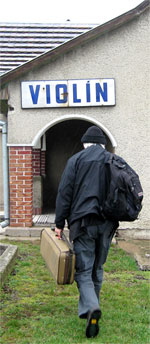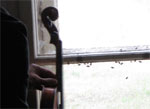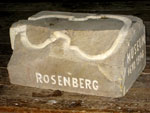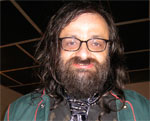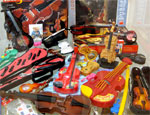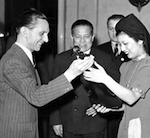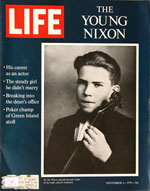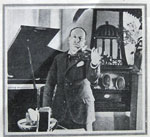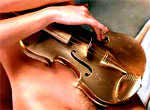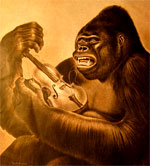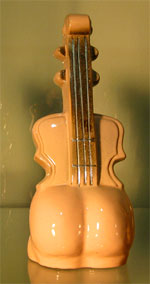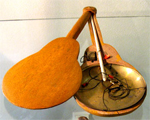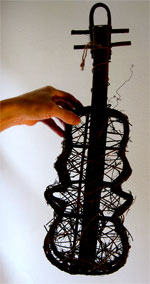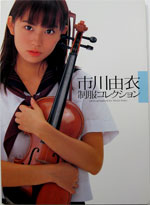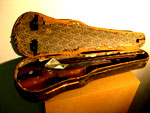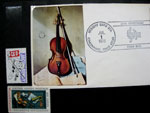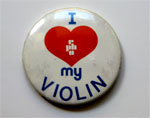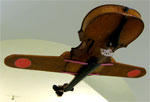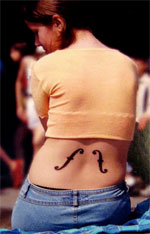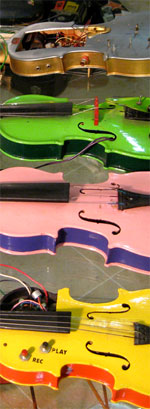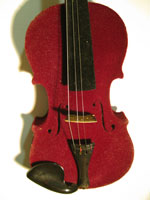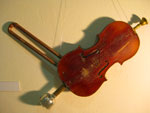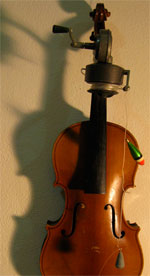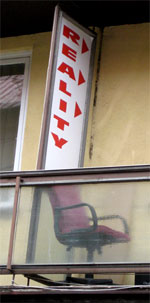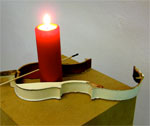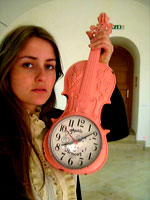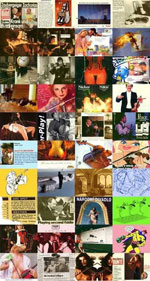 | |||||||

|
Rosenberg Museum 2009 10th Year Anniversary |
|
RETURN TO VIOLIN by Dr. Jozef Cseres Director of The Rosenberg Museum The beginnings of the Rosenberg Museum date back to the mid-1980s, when Jon Rose, tracing the footsteps of Dr. Johannes Rosenberg (1921-1992), came to Berlin with the intention of illuminating the activites of the large Rosenberg dynasty. These steps finally led him to Violin, a small village located at the Slovakian-Hungarian border, where the Rosenberg Museum was founded in 1999. As those who survey this page may already know, the 10th anniversary of the Rosenberg Museum took place this year in that town of Violin. The festival included music for the connoisseur of warp, for those with misanthropic tendencies, or simply for bretheren who find themselves other. In celebration and in sympathy, the Advisory Board of RM offers extracts from four concerts for your pleasure: 1.Music for Violins and Flies as performed by Jon Rose and Tomás Vtípil and the Flies of the Waiting Room of Violin Railway Station (now sadly decommissioned) on 29/3/2009. Some orders of Diptera are now classified under the suicidal persuasion, having lost the desire to mate; surely they flag the great quo vadis facing musicians of all species in today's aesthetic quagmire? Filmed by Steve Elkins. 2.Serenade for Feedback Violin and Chairs was performed by (in order of chairs) Hans W. Koch, David Subík, Julo Fujak, Jon Rose, Michael Delia, and Tomás Vtípil on 29/3/2009. Filmed by Steve Elkins. 3.The Voice of Violin Record Player circa 1908. Common in many cafes and exotic boudoirs of Slovakia at the turn of the 20th century, this particular model has been lovingly restored by master craftsman József R. Juhász. Filmed by Steve Elkins. 4.Admired by musicologists worldwide, the Toothless Piano of Dr. J. Rosenberg has been in the museum's collection for some years. However, it wasn't stolen by that bloody French circus couple (who disappeared with the 19 String Cello and the Rosenberg Reconstructed Double Bass, which they then proceeded to paint! - sacre bleu, is nozink sacred! - covering over some 1,000 signatures of the good citizens of Saint-Ouen - warning to French criminals - your time will come), instead we hear the Toothless used in an elementary examination of the first temperamental principles of the Rosenberg Relative Music Theory. Filmed by Steve Elkins. The foundations of the Rosenberg Museum are an unstable mixture of factuality, false attribution, music history, twisted aesthetics, and humor. Today, the Rosenberg Museum is such an organic mixture of reality and fiction that even direct participants in this expansive game are at times unable to discern and separate the individual layers. A critic once wrote that the Rosenbergs were the only virtual dynasty to become reality. Nevertheless, it is even more confusing and complex, as we know from Deleuze and Guattari, that only the possible can be realised; the virtual can only be actualized. The high jinks and casual entropy surrounding the Rosenberg Museum fascinate musicologists, art historians, and semiologists worldwide because of the flexible borders between virtual and actual; the uniqueness of this project lies in the fact that the initial conceit was realised through life itself. Real instruments and real musicians go missing from the museum, not fakes. The Rosenberg Museum celebrates willfull disfunctionality - the likes of which would cause many an art museum to run scared. Diary from the Rosenberg Museum Festival 29/3/2009 Marie Mart © 2009 8:00 Woke up from a rough night. Laid awake for hours wrestling with Hegelian questions - was I setting out to discover the nature of freedom or the freedom of nature? And like other sleepless nights, I was indulging myself in the odd Rosenberg aphorism 'the violin is essentially a TV set' (1), although he never could have said that because it didn't happen on television (I also note that Baudrillard didn't die on television). 9:15 We gather at the station with a bunch of musicians including Michael Delia and his beautiful girlfriend and his musical saw, and Don Ritter the Harvard educated-installation artist - nerdish tendencies are being exhibited. Steve Elkins is the the curious filmmaker from the states - is he nerd or is he non-nerd? Looking surprised to find himself there, I spot Josef Ceres the curator of the Rosenberg Museum... shouldn't he be smoking one of those central European cigars? He has the right beard for it. Pity smoking has disappeared along with reading newspapers. David and wife arrive, both energetic and expressive (must be working for the tourist commission), Hans, a German musician and well eh - possible nerd, and of course my father, a bona fide nerd who didn't sleep well either, haunted by premonitions of the Danube flooding again and destroying the town of Violin - again. Other ashen-faced collaborators hang around on the group's periphery. Had an interesting conversation with Steve about Tarkovsky being such a lovely man. Then he asked so many questions that I couldn't finish my coffee. Jozef's philosophy students are already onto their second bottle of hard stuff. 9:37 Breakfast in a nostalgic coupe in the train to Nové Zámky. Eating my fried eggs and drinking my second coffee while looking at the damp Gaussian greyness rushing by. So far, not so bad! David is wearing an 'El Dorado' hat, and suddenly a shard of Rosenberg relativity flashes in front of me. Are we on the right train, is this Japan? Not for its 'alternative sense of reality' (2), as Miss Manamai wrote in the Kai Magazine in 1985, but for its post-Kantian sense of the sublime in which the production of silk played a big part, along with flower arranging, ritual belly-splitting suicide, landscape gardening, penis amputation a la Sada Abe, calligraphy and Noh theatre. However, gazing out the train window, I do not see the snow-lined peak of Mount Fuji floating past, nor the Taj Mahal, the pyramids of Eqypt, the Grand Canyon, The Great Wall of China, or The Sydney Opera House. I am distracted from my philosophic state of minds by a chicken-type haired Czech sitting in front of me, shaking my leg, and offering me some of his schnapps. The museum director's philosophy class is in full swing, or should that be swig? 13:10 Waiting for the bus to arrive in Josef's hometown. The place could be described as an existentialist heaven or a dump, with its sad shops and small blinded windows and deserted streets. It's Sunday, so I'll go with the notion of heaven. Josef's students are getting more and more impatient and doing some serious drinking. 13:45 Still no bus and trying to protect myself from a random ball. Every time I turn around, I just have time to jump out of the way of the wet projectile; students are practicing their football skills. They could be by now described as officially drunk. 13:55 Just discovered a sign saying REALITY and pointing towards a room on the second floor of the classic East Block hotel in front of us. We gather around to stare; I feel a conversion coming on - it's Sunday after all. Boy, do I like the Slovakian sense of reality. The musicians are in the dining room of the hotel eating excessive deserts; funny how every single detail of the interior can be so badly chosen. This is beyond Descartes, beyond split, beyond free choice, this is the unification of the impossible. 'There is now ample evidence to support Rosenberg's claim that the Earth has, from time to time, suddenly reversed its spin' (3). Ah, that must be it. 14:03 Finally the bus arrives. Amazingly enough, the whole bus is full. From what Universe did all our passengers arrive? Sun Ra would know, but I am at a loss. A full tourist bus on its way to Violin. Why not? Suddenly I'm thinking about the reaction of the inhabitants if they see us. Last time, they recognized the Rosenberg crowd as relatives of a pilot who crashed in Violin during World War II. Then a man on a tractor started shouting, 'Go away, we don't like violins in Violin'. Glancing around the bus, there is no way they are going to believe that I am related to any of them. Phew! Not even my father? I could be a cousin of Steve, but that's about it. I'm imagining crazed Slovakian farmers waving their violin rakes at us in anger. 15:10 Just passed the street sign for the town Violin. The musicians burst out in applause as if they have just entered the Promised Land. The students are speechless, mouths agape, for beauty struck them as never before. And I? Who am I? I am one of the Rosenbergs, amongst a busload of victims; we are all in need of redemption - that's why we are here. Maybe I'll meet my twin Rosenberg. 15:15 No angry Violins to be seen. In fact, nothing at all to be seen but a rundown train station in which trains no longer arrive, but meanwhile a thousand flies have come together to commit suicide. This hopelessly tragic scenario immediately inspires my father to perform a wake with another violinist called Tomás Vtípil - and the flies. I note that this could well be a Freudian act, a quasi-medical grooming of the species group as psycho-religious foreplay. A similar pattern was previously revealed with the interrogation of spaghetti through the violin bow. It's all there in 'Violin - An Instrument of Sexual Repression' (4) Note: I must ask Pappa to explain this! 15:36 The students decide to play football as the football stadium, which is in fact a field with overgrown grass - deserted. This is obviously a mind-body split dilemma, I tell myself. Jozef informs me that an earlier game in 2000 between a Rosenberg team and a local team from Violin ended with the Museum side winning and Jozef being threatened with his life if he didn't leave town. The Rosenberg team won by mowing a channel through the grass to reach the opponents goal - he says! In those days the goal posts apparently swayed at a 45-degree angle; these days, they have achieved verticality. You can't stop progress. As I'm not going to cover myself in mud, I decide not to participate and instead to start a conversation with Hans. Strange how one man can seem as innocent as St. Catherine, and then you find out he has a criminal record. 'Stealing the manuscript of Johannes Rosenberg wasn't the worst thing, selling it to Don Ritter nearly put me in the slammer,' he surmises. 16:15 Rain is falling steadily now. We are gathered in the greyness awaiting someone to arrive with the key to The Rosenberg Museum. The football game has dissolved. Entropy is de rigueur around here. 16.30 Key arrives. Inside the grey concrete blocks of the clubhouse, there is a stage, a bar, and even a small bibliotech. 16.40 The concert splutters to the start with Delia, Hans, and David performing 'The Last Trio with Saw'. I always have my doubts when artists use the word 'last'. Is it used as a passive acceptance of what Lyotard refers to as 'the colour of the times', putting 'an end to experimentation, in the arts and elsewhere' (5), or as a warning that this might be the last time you hear this trio because all three of them are past their 40's? I stop the art-think and start listening. Turns out to be quite beautiful...with Hans holding and using his laptop as a very quiet button accordion. Too bad it's for the last time. Julio Fujak is on second and does an orgiastic duo with his bow and puppet. The puppet appears confused, as Julio is playing his hair with the bow - where is the shampoo? Time has temporarily stopped, or I have given up checking. Art apparitions invent themselves on the stage of the Rosenberg Museum: a game of musical chairs and feeding back violin, an even louder electronic violin piece by Zsolt Söré, an acoustic violin piece by Tomás Vtípil in which the full meaning of the uncertainty principle is championed as violinist dashes this way and that about the stage. Michel Murin delivers a violin story of intrigue, József R. Juhász stands on stage like a medical experiment, he is playing a stringless violin while colored puss oozes out of a hidden orifice. No exploding violins then this year. 10 years ago, Ben Patterson, former famous Fluxus artist, had been seen on this very stage cutting up violin cases, putting the bits in a blender, and making marmalade. The mayor of Violin and his wife had arrived hoping for Mozart; they spent the concert with their backs to the wall waiting to make their escape. Mr. Patterson is unavailable this time around. He sends a set of simple animal picture cards with the letters of the alphabet on top. Why bother, I think. Oh well, it caused a reaction, with everyone in the museum suddenly exhibiting Fauvist behaviour. Langer once said 'Not communication but insight is the gift of music', a knowledge of 'how feelings go' (6) And all of a sudden I watch my father doing dolphin moves. Oh, how he swims, his body bursting with years of frustration! There is a theatrical dispute with an owl; no sympathy there. The animals rage and rage, and I run for the safety of the bar. I must say, a very dramatic end for a concert. 18:00 I note that linear time has resumed. I ask the current mayor and his wife if they liked the concert. The mayor looks as if he were going to implode in Slovakian melancholy and his wife, slowly but fierce says: 'IT WAS VERY STRANGE!' Yes, indeed. As Schwitters observes, 'truth is a fluid that looks like crude oil or petroleum. Petroleum and the truth have to be drilled out'. I am reminded of that scene in Rosenberg's dental surgery (7) - the Australian violin dynasty has certainly left its mark on this poor woman. 18:31 On our way back to Nové Zámky. It is still steadily raining; even the black of night exudes a damp grey. We stop for refreshment; the dolphin and owl, the sheep, a cat, dog, mouse, cow, donkey, camel, etc. clamber out of the bus, and set out across a creaking wooden bridge across a huge river (is it the Danube, are we afloat on Noah's Ark, are we the only ones left?). 19.20 The Ark moors by a bar, inside on the wall amidst heads of dead deer and other animals; I spot some Rosenberg memorabilia 'We are creating a monophonic culture which addresses itself in grey and monotonous tones. Nothing is left to chance, talent is un-required, the territory of experience is controlled, reduced and cheaply sold. But for those who would deal with fate, there are still the boundaries of desire where the logic of meaning evaporates' (8)...or was it in the book? 1 Count Elsinor de Selby, Violin Music in the Age of Shopping, The Rosenberg Memorial Lecture, NMA, Melbourne (1992: 173) 2 Manamai, M., The Pink Violin, Rosenberg in Japan or The East is Pink, Kai Magazine, Japan (1985) 3 Olga Lipinski, Music in the Age of Shopping, Rosenberg, Chaos and the Violin, NMA, Melbourne (1992:19). 4 Grace Andreachi, Music in the Age of Shopping, A letter from the Diary of Judy Rosenberg, NMA, Melbourne (1992). 5 J. F. Lyotard, Answering the Question: What is Postmodernism? text fragment from: Innovation and Renovation, eds. I. Hassan & S. Hassan (Madison, WI 1982) 6 S.K. Langer, On Significance in Music, text fragment from; The Philosophy in a New Key (Cambridge, Mass. 1978, oorspro. 1942), pp. 244 7 Jon Rose, Brain Weather, radiophonic drama, scene two, ABC Radio, 1992. 8 Manamai, M., The Pink Violin, Rosenberg in Japan or The East is Pink, Kai Magazine, Japan (1985:205) The Rosenberg Museum is proud to announce that its anniversary year has been sponsored by The Eurovision Song Contest 2009! Never before have so many violinists been assembled in one place to play so much... 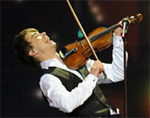 Finland  Slovenia 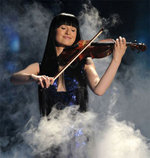 and eh... I already forgot! the music heard on this page comes from an improvisation for violin and very long Revox tape loop, played by Jon Rose and Adrian Keenan 26/11/77 Sydney, originally released on Fringe Benefit Records.
|
 |
